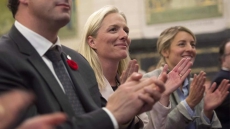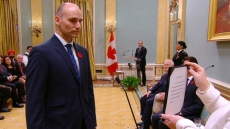VICTORIA — British Columbia moved to make room in Metro Vancouver's incredibly tight real estate market Tuesday with tax changes that aim to help buyers and builders of homes valued up to $750,000, while targeting those able to afford properties valued over $2 million.
Finance Minister Mike de Jong tabled B.C.'s fourth consecutive balanced budget, posting a surplus of $264 million.
The Liberal government said housing affordability, especially for first-time home buyers, is an area of major concern, where average prices for homes in many Metro Vancouver neighbourhoods are above $1 million.
Prices for single-family homes in most areas of Metro Vancouver have increased between 45 per cent and 70 per cent over the past five years, while prices for multi-family homes have jumped between 15 per cent and 40 per cent.
"Is there anything more reflective of who we are as Canadians than the dream of owning a home, and the ability to make that dream a reality," de Jong said. "For many B.C. families, that reality has become harder to achieve in recent years as home prices have continued to rise."

He said the budget contains a new housing initiative that exempts payment of property transfer taxes on newly built homes, including condominiums, priced up to $750,000. The current property transfer tax is set at one per cent on the first $200,000 and two per cent on the remaining price.
De Jong said the exemption will save the buyer of a new home $13,000. Buyers of older homes will continue to pay the property purchase tax at the current rates.
"We are hoping this will create an incentive to construct more, develop more housing," he said. "This is a big change. We'll be tracking closely the changes they have on market and market behaviour. "
De Jong said much of the New Housing exemption will be funded with the creation of a third tier of property transfer tax. The tax involves increasing the property transfer tax rate to three per cent on the value of a home over $2 million.

Buyers of property above $2 million will still pay the existing purchase tax rates of one per cent on the first $100,000, two per cent up to $2 million, but it rises to three per cent tax on any value above $2 million.
De Jong said the three per cent tax is estimated to raise $75 million annually, the amount the government estimates it will need to offset the exemptions for new home buyers.
He said the property transfer tax changes also include measures to collect better data on the identities of home buyers.
Property buyers will be required to disclose their citizenship, said de Jong. The disclosures will generate data that allows the government to monitor the volume of foreign investment, de Jong said.
"The government stopped collecting data that specifically identified foreign purchasers in 1998," said de Jong. "We believe there is a legitimate need to resume that process again."

He said the government also plans to offer families relief on social and health fronts, including exempting children from medical service premiums starting next January and increasing disability payments by $77 a month.
The MSP exemptions will benefit single-parent families by reducing monthly payments up to $72.
The Opposition New Democrats and Green Party have been calling on the govenrment to eliminate MSP payments or include those payments as part of the income tax system.
De Jong said the budget also includes the first deposit of $100 million to its promised Prosperity Fund, which was billed three years ago as a potential $100 billion fund tied to revenues from the liquefied natural gas industry.

De Jong said he and the government are aware there are currently no LNG plants in operation and earning revenues in B.C.
HIGHLIGHTS IN THE 2016 B.C. BUDGET
VICTORIA — The British Columbia government tabled fourth consecutive surplus budget Tuesday: Here are some of the highlights:
— A surplus budget of $264 million and a forecast allowance of $350 million, spending of $47.5 billion and revenues at $48 billion.
— A $100 million B.C. prosperity fund is created out of the 2015-16 budget surplus to be used to help eliminate the debt, invest in health care, education, transportation and family supports.
— Children will be exempt from paying the medical service premiums, a savings of up to $1,298 starting Jan. 1, 2017.

— Investment in new and upgraded infrastructure including $2.9 billion for health-care projects, $3.1 billion for transportation infrastructure, $2.5 billion for post-secondary facilities and $1.7 billion for maintenance and replacement for kindergarten to Grade 12 schools.
— Health care spending is up by 3 per cent to 1.6 billion.
— B.C. Economic Forecast Council projects a provincial GDP growth of 2.7 per cent in 2016 and 2.6 per cent in 2017. The provincial government forecasts its growth at 2.4 per cent this year and 2.3 per cent next year.
— B.C.'s economic growth is attracting people from other regions of the country with a net inflow of 6,315 people from other regions, one-third of those from Alberta.
WINNERS AND LOSERS IN TUESDAY'S B.C. BUDGET
VICTORIA — The British Columbia Liberal government tabled its budget Tuesday. Here is are a look at some of the winners and losers:
Winners — Starting Jan. 1, 2017, all children will be exempted from medical-service-plan premiums. Low income families, individuals and seniors will also benefit from lower premiums for those earning up to $51,000.

Winners — Those who buy newly-constructed houses and condominiums priced up to $750,000 are exempt from the property transfer tax.
Winners — Monthly disability income assistance rates go up by $77 per month, but that replaces monthly transportation subsidy for the one-third of those on disability who get the benefit.
Winners — Public-sector employees benefit from the improved economy by getting a dividend on wages of as much as $1,298 or .45 per cent that had been written into their last contract.
Losers — Another tax tier has been added to the property transfer tax. Those who buy property over $2 million will pay a three per cent tax on the cost above the $2 million threshold. The current tax of one per cent up to $200,00 and two per cent up to $2 million remains unchanged.
Losers —Government said it will work with the movie and TV industry to review the film tax credit as the lower Canadian dollar already offers a discount.
Losers — Someone who buys an older home under $750,000 still has to pay the transfer tax, unlike those who buy a newly built home.

Losers — With the exception of Quebec, all other provinces, territories and the federal government that aren't predicting a balanced budget.





